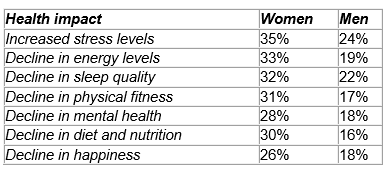
Women's wellbeing suffers more than men's in hybrid world
Research published by health insurer Vitality, as part of a new report on hybrid working, reveals that women’s health and wellbeing is suffering more than their male counterparts in a hybrid working world.
A survey of 2,005 UK office workers found that over a third of women (35%) reported increased stress levels compared to men (24%), with more women reporting a decline in mental health (28% vs 18%) and physical fitness (31% vs 17%).
This may be why more women (71%) than men (53%) are calling for even greater flexibility in how and where they work as a way to improve their health and wellbeing in the future. Of those surveyed, more than two fifths (46%) of women say they would be willing to quit their job if their employer didn’t prioritise their health and wellbeing as part of a hybrid working approach, indicating that they are holding their employer to higher account.
In fact, all employees are clear that they want bosses to play a more active role in supporting their health and wellbeing. Most men and women (82%) believe their employers now have a greater responsibility to offer health and wellbeing support post pandemic – with nearly three in 10 (29%) wanting to relinquish some of their own responsibility for their physical and mental health to their employer.
Table 1: Negative health impacts between female and male employees since work from home guidance was lifted in July 2021:

When looking at which environment supports them best, both men (44%) and women (47%) agree that hybrid working is best for their mental wellbeing. Hybrid working also came out on top for both women (38%) and men (39%) when it comes to productivity.
As employees remained divided on which environment is best for accommodating all their workplace needs, it may explain why our C-suite survey in partnership with CBI Economics found that a third (32%) of business leaders believe that introducing health and wellbeing support for a hybrid workforce is ‘complicated’.
Table 2: Preferred work environment to support employee needs (women vs men):

Dr Katie Tryon, Director of Health Strategy and Behaviour Change Expert at Vitality, said: “Our report shows that both employers and employees are in agreement on the many benefits of hybrid working for supporting health and wellbeing. In practice, it’s clear that a ‘one size fits all approach’ in this new working world just doesn’t work for many women.
"We know the work-life juggle for women is still a key challenge post-pandemic, having a real impact on their mental health, sleep patterns, energy levels and happiness. This could be for many reasons, from women often taking on a greater proportion of the caring responsibilities to feeling greater pressure to prove themselves at work or facing the effects of female specific health issues like the menopause.
“Ensuring women have the flexibility to work in a way that best suits them as individuals and supports their own health and wellbeing is key, and it’s great that we’re seeing this shift with hybrid working. But building healthy hybrid workplaces means businesses need to evolve from tick box polices to personalised programmes using their own data and technology. By building a clear picture of what your employees need and incentivising positive behaviours, we have the potential to unlock powerful benefits for employees, for businesses and for society.”
All findings have been published as part of a new report, available to download now on the Vitality website.
For the last decade, Vitality has been supporting businesses to understand how the health and wellbeing of their employees is affecting productivity through Britain’s Healthiest Workplace, the UK’s largest workplace wellbeing survey.
The free survey enables business leaders to develop effective and targeted strategies to suit specific needs of a business and its workforce.
Vitality additionally provides support to businesses, developing strategies that enable employees to make meaningful and long-term behaviour change, through the Vitality Programme; a science-based approach that incentivises and rewards people to take steps to be healthier.
Employees engaged with the Vitality Programme report 28% less sickness episodes compared to unengaged employees.

